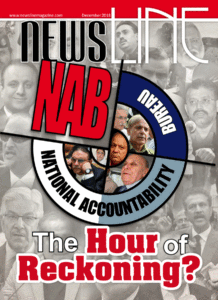Editor’s Note: December 2018
By Rehana Hakim | Editor's Note | Published 7 years ago
 The rubicon has been crossed: Khadim Hussain Rizvi, Afzal Qadri and assorted members of the Tehreek-e-Labbaik Pakistan have been booked on charges of treason and terrorism. After dragging its feet for several weeks, the PTI government has decided to proceed against a fascist extremist group that held the country hostage and challenged the writ of the state following the Supreme Court’s verdict in favour of Aasia Bibi, a blasphemy accused who had been languishing in prison for nine years, after being awarded the death penalty on dubious charges of blasphemy by the Lahore High Court.
The rubicon has been crossed: Khadim Hussain Rizvi, Afzal Qadri and assorted members of the Tehreek-e-Labbaik Pakistan have been booked on charges of treason and terrorism. After dragging its feet for several weeks, the PTI government has decided to proceed against a fascist extremist group that held the country hostage and challenged the writ of the state following the Supreme Court’s verdict in favour of Aasia Bibi, a blasphemy accused who had been languishing in prison for nine years, after being awarded the death penalty on dubious charges of blasphemy by the Lahore High Court.
This is the second piece of heartening news emanating from PTI quarters. The first was the opening of the Kartarpur route allowing Sikh yatrees from across the border visa-free access to one of its holiest sites in Pakistan, the Guru Nanak gurdwara. This gesture is being viewed as a harbinger of peace, engendering in the process ‘Jiye Imran Khan’ slogans in Sikh-dominated Indian Punjab, in an increasingly rabidly anti-Pakistan India, under the ultra-Hindu Modi.
Other than that, the PTI has disappointed. For a party that swept to power on the back of lofty claims and promises, it has not exactly turned in a sterling performance. The PTI’s 100 days in power have been marked by many twists and turns, dithering and a seeming lack of direction, leading to a state of confusion and uncertainty in the country.
The most glaring example of this is the disturbing state of the economy. After promising to break the begging bowl, the PTI has to had to approach multiple sources, including the IMF, for funds. Some economic pundits are forecasting a default as the rupee plummets, the dollar soars, the balance of payments position turns precarious and the IMF package is in limbo. The Saudi bailout package will not take us far and the Chinese are not promising loans, only investment in projects. Admittedly, all planned projects will take time to come to fruition.
The promise to widen the tax base remains just that, and the FBR has failed to improve upon the tax revenue collection. Further, if the PTI government had hoped to recover the black money stashed abroad by corrupt rulers, clearly that is not happening anytime soon.
While one recognises that corruption was the central plank of PTI’s manifesto, the party’s constant harping on it, both inside and outside the assemblies, is beginning to grate on everyone’s nerves – most of all the parliamentarians’, who are constantly being referred to as “chor” and “daku.”
How does Imran Khan hope to fulfill his agenda of fiscal, judicial, social and political reforms without the support of a cooperative opposition, given his wafer-thin majority in the assemblies and minority in the Senate? The chairmanship of the Parliamentary Committee continues to remain a bone of contention, consequently the formation of assorted committees to steer the legal reforms is also on hold.
The PTI has also fallen short on other counts. It has reneged on its own promise of depoliticising the police and the bureaucracy. It sent home a DPO of Pakpattan and two IGPs (of Islamabad and Punjab) for refusing to follow orders from their political bosses. Further, it has transferred and posted bureaucrats at will.
As expected, the harshest critics of the PTI dispensation are the PPP and the PML-N; both have brought out scathing White Papers on the PTI’s 100-day performance.
The PTI’s shortcomings aside, wouldn’t it have been a better idea for the two parties to work on White Papers delineating their own respective sins of omission and commission in order to improve their showing in the 2023 elections?
Rehana Hakim is one of the core team of journalists that helped start Newsline. She has been the editor-in-chief since 1996.


